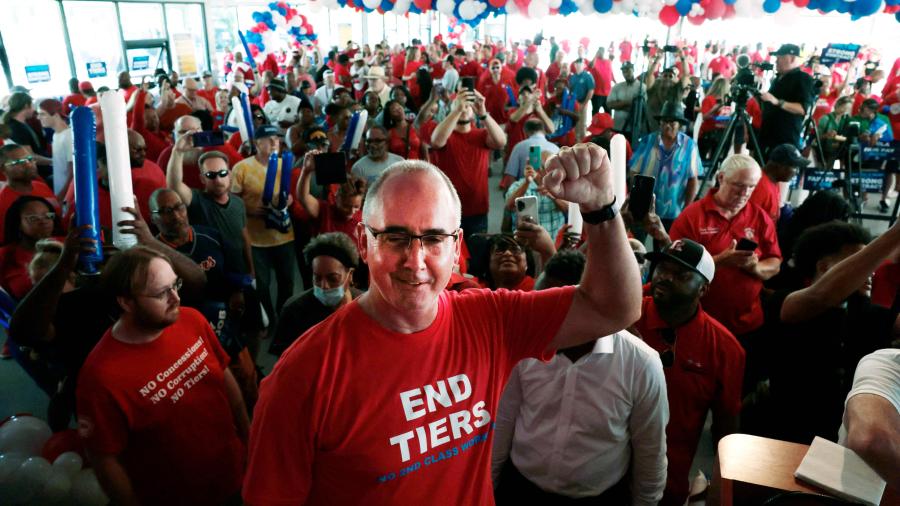
Shawn Fain, president of the United Auto Workers, led a historic labor strike against the Big Three Automakers (Stellantis, General Motors, and Ford), in the latter half of 2023. Less than a year after assuming the presidency, Fain’s leadership extended the possibilities and imaginations of the American labor movement. Fain’s presidency represents a stunning reversal of the conditions that nearly led one of America’s oldest labor unions to the brink of collapse five short years ago.
Prior to becoming the first democratically elected UAW president, Fain was a member of UAW Local 1166 which represented the Chrysler plant in his hometown of Kokomo, Indiana. He served in various leadership roles in his Local and eventually worked his way up to the position of UAW Negotiator in 2009.
Fain is an outspoken critic of concessionary bargaining practices, an issue that chronically plagued UAW leadership for decades. He opposed the ratification of the 2007 tentative agreement with the automakers because of its imposition of two-tiered wage scales and a 50 percent wage cut. The automakers used the 2008 economic recession as an excuse to bargain down UAW contracts. Other longstanding UAW benefits like Cost-Of-Living Adjustments (COLA) were removed during this period with the initial promise of being reimplemented after the recession was over. The Big Three never honored this promise despite the auto industry’s recovery in the 2010s.
The largest corruption scandal in UAW history revealed the true costs of concessionary bargaining when two UAW presidents were brought down on charges of embezzlement and racketeering for accepting bribes from executives at Fiat Chrysler (now Stellantis) during the 2019 contract negotiation cycle.
This somber and traumatic moment was indicative of the foundational issues of the UAW’s leadership structure. The union elected its leadership via delegates at constitutional conventions instead of a direct vote.
For over 50 years, a leadership circle known as the Administration Caucus dominated the internal politics within the UAW. Over time, the national leadership became increasingly disconnected from rank-and-file members and more subservient to the companies they were bargaining with, as evidenced by UAW members voting down two negotiated contracts with John Deere in late 2021.
After the 2019 financial corruption scandal, the federal government placed the UAW under interim monitorship. After its assessment of the UAW’s organizational structure, the Department of Justice mandated a constitutional referendum on adopting a direct election system for national leadership positions. UAW members overwhelmingly voted in favor of direct elections, which paved the way for a reform-minded leader like Shawn Fain to win the presidency.
Fain was elected UAW President in March 2023 by only 500 votes out of 138,435 cast by UAW members. Going into the 2023 contract negotiation cycle, he promised to exert more militancy toward the Big Three. The UAW’s initial demands were an end to two-tiered wage and benefit scales for workers hired after 2007, reinstatement of COLA, and a 40% wage increase for UAW members to match the increase in CEO and Executive pay over the past decade. In many of Fain’s media appearances he said record profits should mean record contracts for workers, which had not been the case for some time.
UAW members formed their picket lines on September 15, 2023 after the Big Three refused the demands made by the union and the previous contract expired. Fain pushed for a stand up strike strategy as opposed to going on strike all at once. The most profitable plants were targeted first to provide maximum negotiating leverage. As the Big Three began feeling the heat from the strikes, the public, and President Biden, they began increasing their offers. The strike ended in early November after the Big Three agreed to a wage increase between 25-and-33%, reinstatement of COLA, and new protections for temporary workers which will put them on track to become full employees. While not quite the sterling heights initially promised, they were certainly record contracts that will significantly improve the lives of auto workers across the country, union and non-union alike.
Fain sees his presidency as an avenue to advance the interests of all working people. He has called on other labor leaders to align their contact expirations to 2028, which could lead to the first large general strike in American history.
For the foreseeable future, Fain is turning his attention to the Southern U.S., historically the region most hostile to union organizing. An effort of this scale hasn’t been attempted since the days of Operation Dixie in the late ‘40s. Major labor victories in the South will further inspire labor militancy across the United States. Shawn Fain’s leadership of the UAW has the potential to pushAmerican Labor out of its four-decade decline and into a new era of working-class revitalization.
Photo by Jeff Kowalsky for AFP/Getty Images.